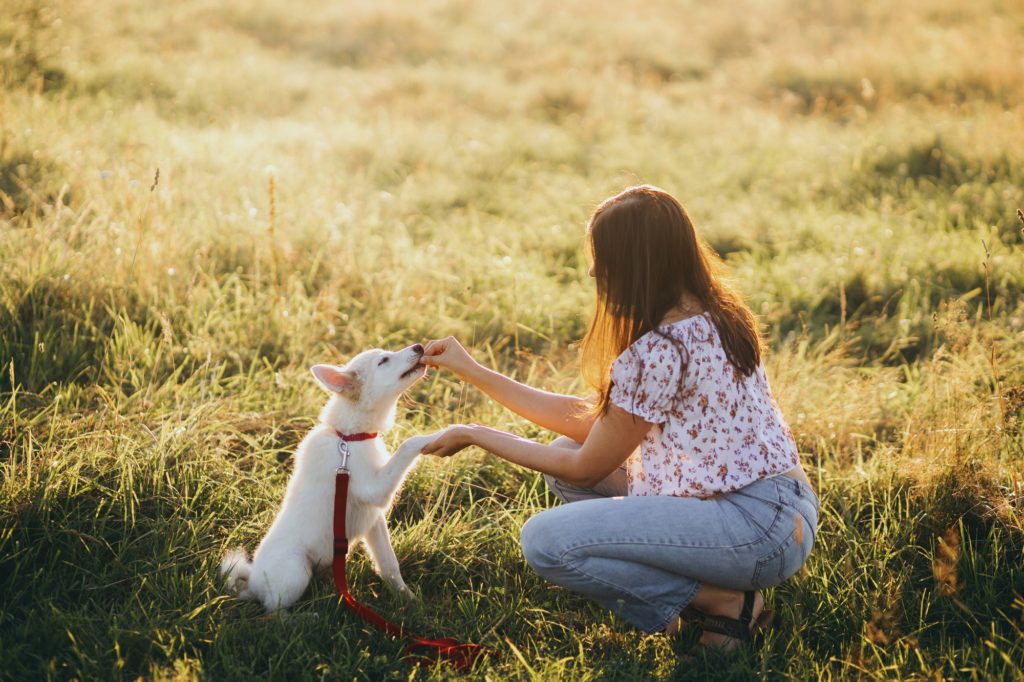Picking out a puppy – or even adopting an older dog – is a big responsibility. There are so many factors that can contribute to whether or not a dog is a good fit for your family. A process called “temperament testing” can help you find the right match! There are a few things that you need to consider while going through this process:
Lifestyle and Daily Routines
Take a good, hard look at your lifestyle. The dog you choose will be subjected to your routine and lifestyle, regardless of your intentions. I know that I would love to believe that I’m super active and go hiking all the time. And while I do enjoy hiking and camping, realistically I’m only able to go maybe once a month. Most of my days are a little more routine and sedimentary than I’d like to admit. When I have training lessons, my dogs are left at home, or if they’re with me, they’re likely in a crate or on their “place” during my lessons. When I’m not training, I’m usually in my home office writing blogs, taking care of bills, or making phone calls, which means my dogs are vegging on their beds. Since I’m not as outdoorsy as I’d like to think I am, I need to make sure I’m giving my dogs a physical and mental outlet. They are both high-energy herding-breed mixes, and I can absolutely tell by their behavior when they haven’t had enough stimulation and exercise. But when we are able to go hiking or to a dog sports event, they LOVE it!

So yes, the first thing you need to do is take a good look at your realistic lifestyle. If you work an office job and are gone for 8-10 hours a day, it would be a bit unfair to bring home a high-energy, working breed unless you’re able to bring them to doggie daycare or hire a dog sitter/walker or you have kids at home that can responsibly care for them. If you DO lead a very active lifestyle and need a dog that can keep up with your multi-mile runs, then you may want to steer clear of lap dogs or dogs that have trouble breathing in the heat.
Research and Reach Out
Do your research! Once you have a realistic idea of your lifestyle, start researching your breeds. Even if you plan to rescue a mixed breed, it is always a good idea to have a basic understanding of breed temperaments. My Kona Bean is a catahoula/border collie mix. Both of those breeds are INTENSE. Kona was a shelter dog, and a stinkin’ cute puppy. Her original adopter (rightly) thought she was precious, and then brought her home only to realize that she was WAY more dog than she could handle.
And yes, some dogs don’t “fit the mold” of their breed. I fostered a blue heeler that was the sweetest, most mellow soul. My mom had a corgi/shepherd mix that just wanted to sleep all day. And I know a bulldog who jumps in the swimming pool as if she was a retriever, even though she can’t swim to save her life! So breed isn’t the end-all-be-all decision-maker, but having a basic knowledge of breeds can definitely help your process!
Another thing to research is your breeder and/or rescues! Call around, ask questions, look at reviews. Does the breeder do any health testing? Does the shelter do any behavioral testing? Etc etc. If you’re looking at a breeder, ask if they will let you talk to other puppy buyers. If looking at a shelter, talk to the workers and volunteers and ask them questions about the puppies you’re interested in.
Go ahead and develop a relationship with your local dog trainer! Even if you don’t have the dog yet, it’s a good idea to reach out to them with advice and enroll in future classes. Most dog trainers want to set pups and their owners up for a successful relationship, and we LOVE it when people are preparing and learning before they even have possession of their dog! They can give you great resources to hit the ground running when you bring your new family member home!

Temperament Testing
And finally, there is actually a “temperament test” that you can use to help you determine if a puppy (or adult dog) is right for you! There are a few versions, but I’ve found this one to be very helpful: The Puppy Aptitude Test. When you’re visiting with a potential adoptee, try some of these things and watch the puppy’s interactions with its environment, but please also take into account, especially if you’re adopting from a shelter, that a shelter environment can be very different from your home’s environment. A dog may be a little more reserved in the busy atmosphere of the shelter and then “wake up” when they adjust to your calmer house. Or a puppy can be overwhelmed and overstimulated in a shelter and act out in ways that they wouldn’t in a calmer place. But this test is a great place to start! And remember, ask questions!!!!
A New Family Member
Finding a new family member can be an overwhelming experience, but if you take advantage of the knowledge that’s out there and plug in to a community of dog-lovers, it can also be a very rewarding experience! Enrolling in an obedience class with June as a puppy was one of the best things I have ever done! Don’t hesitate to ask questions and take your time. And even armed with knowledge and experience, most of the time your heart will tell you when it’s right.


